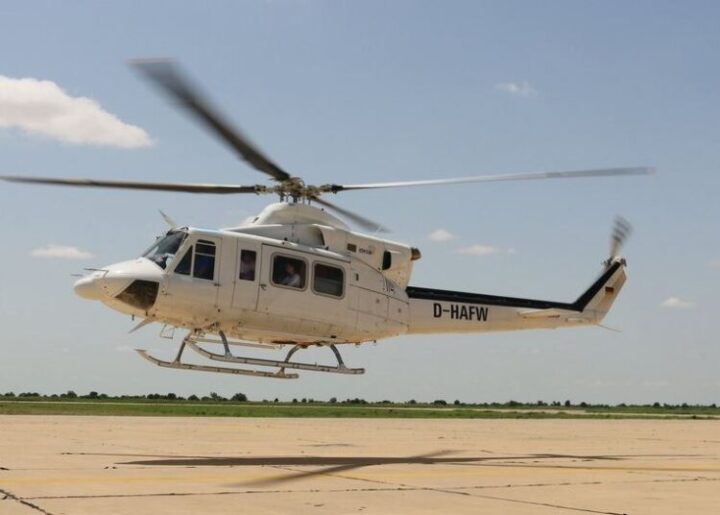A growing chorus of aviation professionals, business leaders, and development advocates is urging the Federal Government to abolish the $300 landing fee imposed on helicopter operations at Nigerian airports. They argue that the charge undermines efforts to improve connectivity, discourage private investment in air mobility, and hinder the growth of a potentially lucrative niche in the aviation sector.
Introduced quietly in recent years as part of a revised fee structure, the $300 fee is levied on each helicopter landing at commercial and government-run airports. While the amount may appear modest in global aviation terms, industry stakeholders say it is prohibitively expensive for smaller aviation operators, especially those specializing in agricultural services, medical evacuations, tourism, aerial surveying, and charter flights.

Helicopter operators who spoke under the condition of anonymity cited the fee as a key factor that has prevented many clients from choosing air travel for short-distance and precision operations. In the agricultural sector, for instance, aerial spraying companies lament that the fee increases overhead by a significant margin, making helicopter services only attractive for large-scale farms or urgent projects, rather than small farms or community clinics.
“It’s an unnecessary barrier,” said one pilot who offers charter services across the Niger Delta. “Instead of fostering innovation and increasing charter usage, it discourages clients and constrains operators who could offer lower-cost, on-demand services. If Nigeria truly wants to modernize its air transport, they need to remove these outdated, punitive fees.”
The tourism industry is another area feeling the impact. Operators specializing in sightseeing and luxury travel say the fee discourages planned aerial excursions, helicopter airport transfers, and bespoke aerial experiences. “We had clients ready to pay, but after including landing fees and handling charges in the trip cost, they became unaffordable,” said a tourism operator. “Instead of showcasing the beauty of Lagos Lagoon or the Tin Can Channel via helicopter, clients opt for more expensive and less unique tour options.”
Business leaders are also warning that, during crises or state visits, the fee can delay emergency flights, cargo movements, and diplomatic missions. One Abuja-based logistics expert noted that the fee structure was unclear and inconsistently applied, leading to confusion during urgent flights. He called for a “clean, transparent policy” that eliminates such contentious costs.
Some aviation experts argue that removing the fee would not only lower the cost of helicopter operations but also generate broader economic benefits: increased tourism, faster agricultural deployment during planting seasons, improved emergency response, and greater attractiveness for foreign investors exploring helicopter-dependent industries like oil and gas, mining, and construction.
In support of the appeal, professional associations such as the Helicopter Operators Association of Nigeria (HOAN) have petitioned the Ministry of Aviation and the Federal Airports Authority of Nigeria (FAAN) to conduct a comprehensive review of the fee policy. HOAN officials say they are preparing data-backed proposals that project the economic gains from scrapping the fee versus the minimal loss in government revenue, especially if it boosts flight activity.
The FAAN and the ministry have yet to respond publicly, but insiders suggest that revenue considerations may be the primary reason the fee persists. Sources say FAAN relies heavily on user charges to support airport operations, including infrastructure, security, and ground handling services. However, critics counter that the government could instead diversify revenue through landing charges proportional to aircraft weight or flight duration—standard global practices that are fairer and more capacity-based.
Some aviation analysts also point out that while Nigeria’s broader airport charges are already high, helicopter landing fees represent a unique deterrent to a growing air segment. Replacing the flat $300 fee with a graded scale based on tonnage, trip purpose, or scheduled operation could encourage responsible use without undermining revenue stability.
There is also increasing pressure on lawmakers to intervene. Several senators and House of Representatives members have reportedly expressed interest in sponsoring bills to repeal the fee or mandate a rationalized landing charge structure. They argue that the flat rate is inconsistent with efforts to liberalize aviation, stimulate small businesses, and embrace technological innovations like drone integration.
In parts of the world where the aviation sector supports high-net-worth tourism, precision agriculture, emergency medical services, and flexible logistics solutions, helicopter operations offer a critical edge. Attracting such investments could support job creation, infrastructure development, and foreign exchange earnings. But Nigeria, with its current fee regime, may be sidelining itself.
Nevertheless, the debate over the fee has sparked interest in a broader policy shift. Some stakeholders envision a major overhaul of airport tariffs that would involve restructuring fees for parking, ground handling, aircraft navigation, noise and environmental impact, while aligning them with economic objectives. A modernized tariff framework—one that is dynamic, equitable, and transparent—could enhance Nigeria’s competitiveness in regional and business aviation.
In the meantime, helicopter operators are planning public awareness campaigns aimed at building consensus around the issue. These initiatives include data-driven demonstrations of how much more could be achieved if the fee is removed and helicopter operations are permitted to grow organically based on market demand.
Whether or not the government commits to the changes remains uncertain. But what is clear is that Nigeria’s emerging private helicopter economy—vital to sectors as diverse as agriculture, healthcare, tourism, and logistics—depends on removing regulatory hurdles like the $300 landing charge.
For many operators and clients, the choice is simple: scrap the fee, and unleash the sector’s potential. But for regulators dependent on airport revenue, the decision involves weighing short-term fiscal losses against long-term strategic growth. With both economic and political stakes high, the coming months will determine whether Nigeria prioritizes cost‑effective growth or cementing a fee structure that may stifle aviation innovation.
Support InfoStride News' Credible Journalism: Only credible journalism can guarantee a fair, accountable and transparent society, including democracy and government. It involves a lot of efforts and money. We need your support. Click here to Donate
